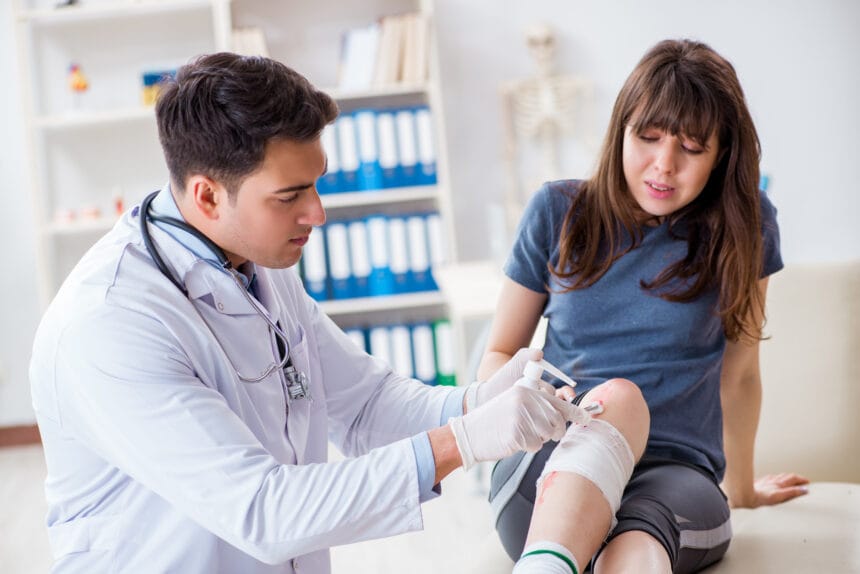Slip and fall accidents can occur to anyone, in any location. Common factors contributing to these incidents include slippery surfaces in stores, uneven pavement, or insufficient lighting in staircases. Such events can result in significant injuries. These types of accidents frequently lead to fractures, ligament injuries, concussions, and, in some cases, lasting disabilities. The consequences can be profound, impacting your ability to work, participate in everyday activities, and overall quality of life.
Understanding the recovery process from both physical and emotional perspectives is crucial for anyone affected by a slip and fall incident.
Understanding Slip and Fall Injuries
Injuries resulting from falls encompass a range of accidents where an individual loses their footing and falls, often resulting in harm. Based on Obral Silk & Pal, these injuries can vary from minor bruises to severe fractures, head injuries, or even spinal cord damage. According to the National Floor Safety Institute, such accidents are a leading cause of injury for individuals over 65, making it essential to recognize the potential dangers present in various environments.
Many people underestimate the severity of these injuries. In fact, common outcomes of falls include wrist fractures, ankle sprains, and traumatic brain injuries (TBIs). These injuries not only impact physical mobility but can also lead to long-term health issues, including chronic pain and reduced quality of life.
Physical Recovery
Seeking immediate medical attention is vital after an incident involving a fall. A thorough examination can identify hidden injuries that may not be immediately apparent. For instance, a sprain might seem trivial but could indicate a more serious underlying issue. Physicians often recommend imaging tests, such as X-rays or MRIs, to assess the extent of the injuries accurately.
Once a diagnosis is made, appropriate treatment can begin. This may involve rest, medication for pain relief, and in some cases, surgery. Early intervention is crucial in preventing complications and facilitating a smoother recovery process.
For many individuals, physical therapy becomes an essential part of recovery. A physical therapist can develop a personalized rehabilitation program, focusing on regaining strength, flexibility, and balance. This rehabilitation is critical, especially for older adults, as it helps restore functionality and prevents future falls.
However, it is important to recognize that recovery may not be straightforward. Some individuals may experience chronic pain or complications that hinder their progress. For example, persistent discomfort from a previous fracture may require ongoing treatment and management strategies to ensure the best possible recovery.
Emotional and Psychological Impact
The aftermath of an injury due to a fall can be emotionally taxing. Victims often experience a range of emotions, including fear, frustration, and anxiety. The sudden nature of these incidents can lead to feelings of helplessness and vulnerability, particularly for those who are used to being active and independent.
These emotional responses are normal and valid. Acknowledging them is the first step in addressing their impact. It’s essential for victims to understand that they are not alone and that support is available. Open communication with family and friends can help create a supportive environment during the recovery process.
For some individuals, the emotional impact of an accident involving a fall can extend far beyond the initial injury. Psychological issues such as anxiety disorders or depression may develop as a result of the trauma experienced during the incident. Individuals may also become fearful of falling again, leading to decreased activity levels and social withdrawal.
Mental health support is crucial for those experiencing these long-term effects. Professional counseling or therapy can provide valuable tools for coping with anxiety and regaining confidence. Additionally, support groups for individuals who have experienced similar incidents can offer a sense of community and understanding, helping victims feel less isolated in their struggles.
Coping Strategies and Resources
Recovering from an injury due to a fall requires more than just physical healing; it also involves addressing emotional and psychological needs. Developing effective coping strategies can significantly enhance the recovery experience. Techniques such as mindfulness, meditation, and journaling can help individuals process their feelings and reduce stress.
Utilizing available resources is equally important. Victims should consider reaching out to healthcare professionals for mental health support or joining support groups to share their experiences. Online resources and hotlines can also provide additional assistance and information.
Furthermore, involving family and friends in the recovery process can create a robust support network. Engaging in social activities, even in modified forms, can promote emotional well-being and alleviate feelings of isolation.
Legal Considerations and Seeking Compensation
Navigating the legal landscape after an accident involving a fall can be complex but necessary for recovery. Victims may be entitled to compensation for medical expenses, lost wages, and pain and suffering resulting from their injuries. Seeking legal counsel can help individuals understand their rights and options, guiding them through the process of filing a claim.
In many cases, establishing liability is crucial. This involves proving that the property owner or responsible party failed to maintain a safe environment, leading to the accident. Gathering evidence, such as photographs of the accident scene and witness statements, can significantly strengthen a case. Legal representation can aid in gathering this evidence and ensuring that victims receive the compensation they deserve.
Conclusion
Recovering from a fall injury is a multifaceted process that requires attention to both physical and emotional health. Understanding the types of injuries, the importance of immediate medical care, and the long-term effects on mental well-being is vital for a successful recovery. By employing effective coping strategies and utilizing available resources, victims can navigate the challenging path to healing.
Moreover, addressing legal considerations ensures that individuals receive appropriate compensation for their hardships. Ultimately, recognizing the interconnectedness of physical and emotional recovery will empower victims to reclaim their lives and move forward after such an accident. If you or someone you know has experienced a fall-related injury, remember that support and resources are available to aid in the recovery journey.










